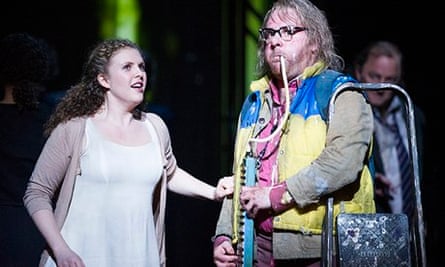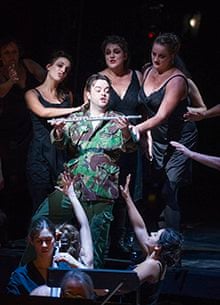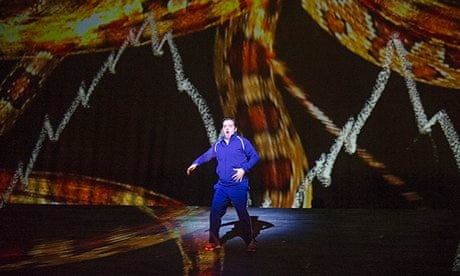Picture a sooty apocalypse in an almost featureless universe. A distraught mother seeks reconciliation with her daughter. Their anguish is played out beneath the gaze of a greasy-haired, salivating Peeping Tom in a cheap suit perched above them. His hiding place is a suspended, tilting stage, which overhangs the women like a giant waffle iron threatening to flatten them out of existence. It's a bleak sight. We know the Queen of the Night inhabits a dark place. If her name gives a clue, her dangerous coloratura music shouts of fear and shadows. But in Simon McBurney's new staging of The Magic Flute for English National Opera, Mozart's enigmatic show-cum-pantomime takes on a yet more sinister hue.
With McBurney, nothing is as you expect. Amid the darkness in this rich, inventive production there were, too, moments of startling humour and theatrical wizardry. The effect is absorbing and finally captivating, rather than slick, fast and empty. His name is synonymous with Complicite, the theatre company he founded in 1983, which is a collaborator in this co-production with Aix-en-Provence and with Amsterdam, where it was seen last year. Physicality, adventure, experiment and surprise are key to the Complicite experience.
All were in full evidence at Thursday's opening night, conducted by Gergely Madaras making his ENO debut, his players raised up from the pit to be more engaged with the action, as they would have been in 1791, the year Mozart wrote the opera, completing it weeks before his death. Whether you fall for the staging or not – many will still harbour desires for Nicholas Hytner's classic production, which made more "for the last time" returns than Frank Sinatra – the singing is mostly outstanding. A strong cast was led by Ben Johnson, lyrical as the yearning Tamino, Roland Wood, engaging if low key as a lost-traveller-with-knapsack Papageno, and Devon Guthrie, touching and true as Pamina.

A confessed opera sceptic for much of his life, McBurney nonetheless has music in his bones, as this production showed. His direction of the orchestral flautist (Katie Bedford), who stepped on stage to play Tamino's magic flute music, and of the celeste player (Soojeong Joo) was inspired. They engaged variously with the action as the work progressed and helped bring alive the sense of all-round entertainment that Mozart and his librettist, the impresario-actor Emanuel Schikaneder, who also played Papageno, so clearly wanted.
Whereas some directors play down the arcane mysteries of this work, robbing it of its sinew yet making it easier for modern audiences, McBurney embraces them all. Numerical cryptograms, masonic symbolism are all part of Mozart's strange game, as Marcus du Sautoy explains in a dense essay in the programme entitled "Mozart and Maths", accompanied by the obligatory pentagram and the schematics of the golden ratio.
In this escape from naturalism into abstraction, McBurney is helped by Michael Levine's robustly intellectual and handsome set designs and Jean Kalman's lighting: the three doors of Wisdom, Truth and Reason are part of a massive library, presumably Sarastro's, of leatherbound books, but most of the stage images suggest life's underlying geometry.
Past and present, the old regime represented by the Queen of the Night (Cornelia Götz) and her gang, and the brave new world of Sarastro – here, a Prospero-type figure – and his creepy acolytes in grey suits, are ever in conflict. They discuss the future of the lovers Tamino and Pamina around a vast boardroom table, the sleek HQ of an unnamed and chilling cult. James Creswell, in black Nehru coat and horn-rimmed specs, was masterly in the ambiguous role of Sarastro: his dubious theft of Pamina from her mother (the Queen of the Night) in the name of beauty and wisdom has always struck me as more morally questionable than most productions allow. McBurney brought out the uncertainty without hammering it home, since the music at that point is joyous and clear. Top praise for the chorus, trained by Martin Fitzpatrick.

The three boys, superbly performed by Alessio d'Andrea, Finlay A'Court and Alex Karlsson, might be old men or emaciated children. The three ladies (the fine trio of Eleanor Dennis, Clare Presland and Rosie Aldridge) first enter in what appear to be army fatigues but soon switch to more voluptuous garb and more sexually predatory behaviour. Monostatos, he of the greasy-hair and lust, was cast as an old-style East End gangland thug, excellently performed though less well sung by Brian Galliford.
Important elements in the staging include the busy employment of an onstage foley artist, particularly for the trials by cataclysmic fire and a deluge of water, but also an entire forest of chirruping birds for Papageno the bird-catcher. The simple mechanics of actors flapping sheet music to suggest birds in flight was one of the evening's most indelible image. Yet video and projection are used cleverly too, from the opening, when a gargantuan snake leaps forward and words are drawn on a chalkboard, appearing and erased in front of our eyes.
The orchestra was on top form, though Madaras's freedom with tempi – great slowings up, particularly – was at times distracting. There is so much to intrigue and delight here, yet this is not a Magic Flute for those seeking reassurance. Towards the end, having united stage and pit, McBurney extends the action into the auditorium, turning the camera on the audience, who can see each other on stage as Papageno and the lovely Papagena of Mary Bevan thread their way through the front stalls. We chuckle at this clever twist. Darkness is indeed eventually cast out by the light of the rising sun. Yet you know the brightness may be short lived: a small light but a big tunnel.

Comments (…)
Sign in or create your Guardian account to join the discussion